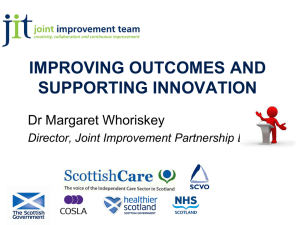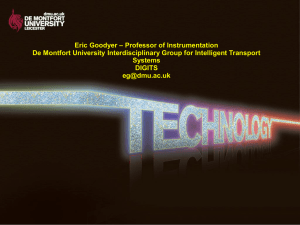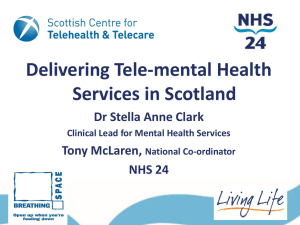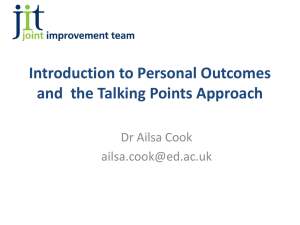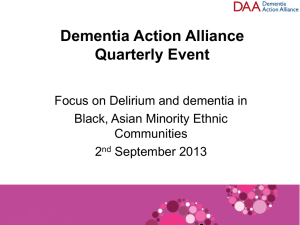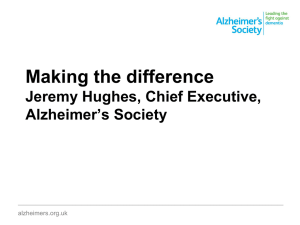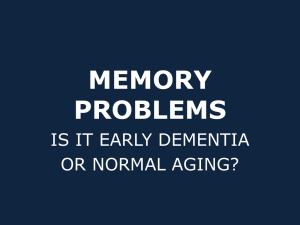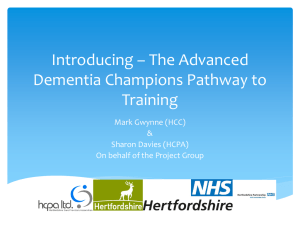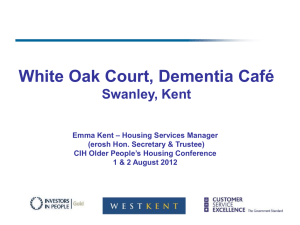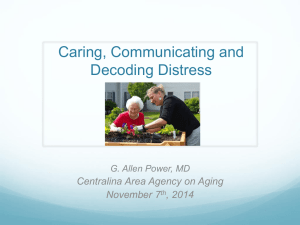Telecare Summit Presentation by Melanie Bussicott
advertisement
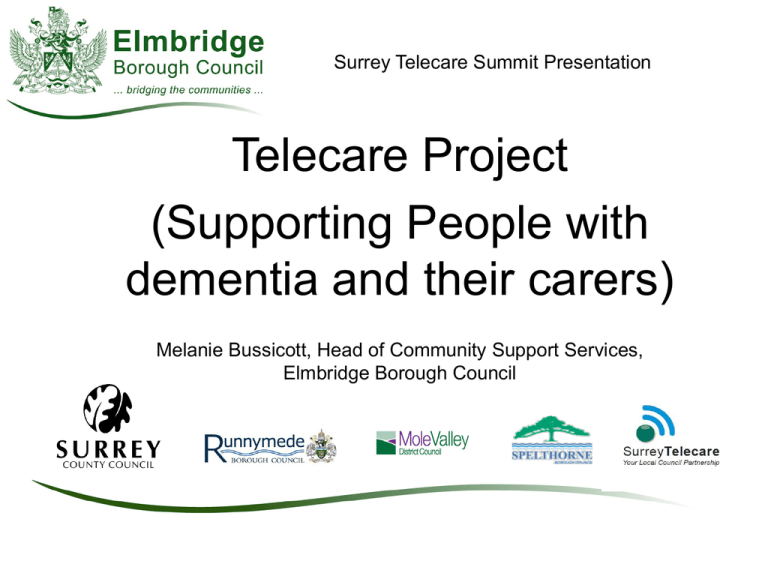
Surrey Telecare Summit Presentation Telecare Project (Supporting People with dementia and their carers) Melanie Bussicott, Head of Community Support Services, Elmbridge Borough Council Why the pilot was required • In 2009 it was estimated that 14,000 older people had dementia in Surrey (by 2020 this is predicted to increase to over 17,000) • National Dementia Strategy 2009 – Driving Forward Improvements • Strong Surrey Strategic Partnership and collective working across both dementia and Telecare Services – emergence of the Surrey Dementia and Mental Health Strategy (five year Strategy to help people live in their own home for longer) – Background Proposal •Why – Leader of Surrey County Council wanted to take forward the Telecare Agenda in Surrey •When – As soon as possible after the Leaders’ announcement •Where – Initially in Elmbridge, Mole Valley and Spelthorne (past history of working together and very good links with Dementia services) •How - £50k funding made available to cover cost of kit and installations and monitoring. Clients/Carers get services free for six months in return for participation in the Project, which involves answering some questions at the start and end of the period. Development of Surrey’s Dementia and Mental Health Strategy • Extensive consultation concluded October 2010. • A key consultation outcome was to ensure stronger emphasis on supporting carers. Quote from consultation: “People with dementia are much happier within their own environment, keeping their own routine amongst things that are familiar to them.” Elmbridge Relief Carers Scheme • A Scheme supporting people with Dementia and Alzheimers Disease and their carers. • Launched in 1986 (needs led). • Carers have stated that during the outset and progression of dementia there are issues and challenges that people do not expect to face. For many people this calls into question their previously held beliefs, attitudes, hopes and expectations, desires, certainties and relationships. What was thought to be a “right” is no longer appropriate. • Scheme developed to offer 9 services including: Sitting Service, Specialist Day Care, two support groups, drop in service, Alz Café, training, outings programme, PALS (life after caring). • What can be done in partnership cannot be done alone. Partnership Working • Strong partnership working across SCC, Boroughs and Districts and the Voluntary Sector. • Telecare Dementia Partnership Group consisting of: Surrey County Council Borough and District Councils within pilot area (Community Alarm Service Managers) Elmbridge Relief Carers Scheme Mid Surrey Alzheimers and Health Partners Key Aspects • Improving the quality of life through appropriate community support • Key role of the older person and their carer • Process: referral form, Agreement, Risk Assessment and follow up • Surrey Telecare Pilot tests: – Right people – Right time – Right equipment • Has it made a difference to the person/carer (needs, expectations, self care) • Future arrangements (Surrey’s eligibility process/ongoing equipment costs) Case Studies • Younger persons with dementia living in Cobham (smoke alarm). • Older persons with dementia living in Esher (community alarm and pill dispenser). • Wife supporting husband with dementia living in Walton (bed sensor). Actions to Date • Launched May • Slow start perceived to be due to lack of awareness of how Telecare can help • Awareness training started in October with help from two Telecare Suppliers; Tunstall and Tynetec (Thank you). Spelthorne and Mole Valley first to have training completed. • Runnymede invited to join Project to help boost numbers. Training undertaken there at outset. • Number of referrals is now picking up Dementia Project Totals (all areas) Installed 28 In pipeline 9 (Assessed and awaiting installation) On hold 8 (Deciding, client in respite/hospital etc) Average cost of installed telecare package per client so far £405. The Way Forward/Learning Points • Vision and passion • Awareness Raising (train, train, train!) • Telecare awareness and training Centre to be launched (supported by portable tools) • Telecare Smart House • Referral process • Response service • Feedback, evaluation and capture • Future working arrangements post pilot The Way Forward/ Learning Points continued • • • • • New equipment Location devises Links across Surrey (good grass root relationships) Client verses carer support Pilot verses mainstream (part of standard care management programme) • High verses moderate challenge (funding and commissioning strategy) • Delay the pyramid climb (part of a personalisation approach meeting individual needs) Reach Sustainability Mainstreaming
